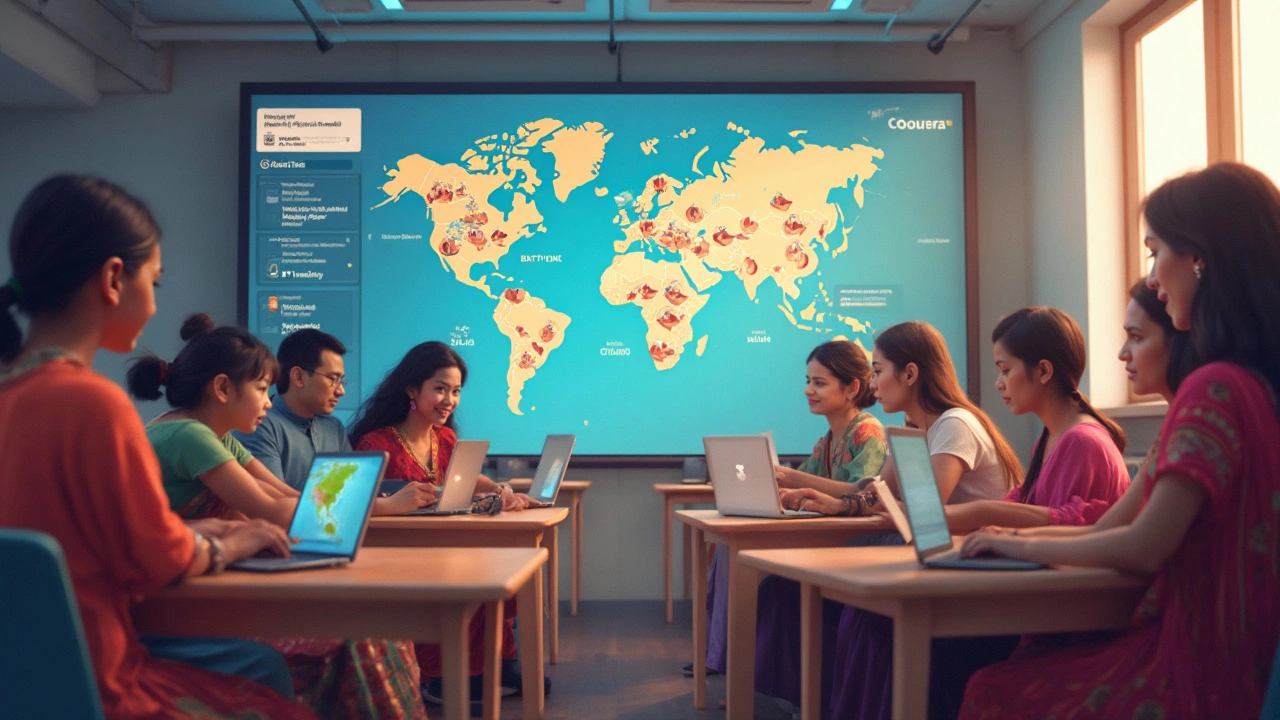Navigating the realm of free online degrees can seem overwhelming, but for those committed to personal growth or career advancement, it’s a treasure trove of possibilities. With the advent of the internet, educational barriers have diminished significantly, offering a myriad of options for free skill training and comprehensive degree programs.
Today, major universities and specialized platforms have made it simpler to acquire new skills and qualifications, transforming how we perceive and pursue education. Whether you’re seeking to shift careers, enhance your current skill set, or simply satiate a thirst for knowledge, free online degrees can be a flexible and viable path.
However, with so many options available, it's crucial to identify programs that truly align with your goals, keeping in mind both the advantages and the inherent challenges of online learning. This article sheds light on how to navigate these opportunities successfully, ensuring your educational journey is both fruitful and fulfilling.
- The Rise of Free Online Degrees
- Where to Find Free Degree Programs
- Pros and Cons of Online Learning
- How to Choose the Right Program
- Tips for Success in Online Education
The Rise of Free Online Degrees
In recent years, the concept of free online degrees has gained remarkable traction, transforming the landscape of education massively. Traditionally, higher education was often perceived as a privilege reserved for those who could afford it. The internet, however, has democratized access, making education more inclusive. Major universities and educational institutions, recognizing the potential of global connectivity, have tapped into the digital revolution by offering courses and degree programs at no cost, ensuring that anyone with the will to learn can achieve a online education.
Harvard, MIT, and Stanford are some of the leading schools that have embraced open learning platforms like edX and Coursera, allowing students worldwide to enroll in courses once available only to their on-campus students. These platforms were designed to offer not just short courses but also full-fledged degree programs in diverse fields such as computer science, business management, and humanities. By the end of 2023, it was reported that platforms offering such courses had reached millions of learners globally, a testament to the growing appeal of these opportunities.
One of the driving forces behind this trend is the increasing demand for skill-based learning and flexibility. Students and professionals alike want to keep up with rapidly changing job markets without the burden of debt. Employers, too, are starting to value practical skills over traditional degrees. According to the World Economic Forum, there will be a sharp increase in demand for employees with self-taught skills by 2030. This shift aligns perfectly with the dynamic nature of free online degrees, which allow learners to set their own pace and choose paths that align best with their interests and career goals.
In addition to the influx of educational platforms, the advent of the COVID-19 pandemic forced a reconsideration of traditional education systems. Online learning became not just an alternative, but a necessity. This shift accelerated the adoption of technology in education and validated the efficacy of online degrees for both students and educators. According to a study conducted by The Chronicle of Higher Education, 67% of universities had shifted significant portions of their programs online by the end of 2021, a number that continues to grow robustly.
"Education is the kindling of a flame, not the filling of a vessel." - SocratesThe saying resonates deeply in today’s context where learning is less about accumulating facts and more about fostering a culture of lifelong learning and critical thinking. Free online degrees embody this philosophy, enabling learners to pursue comprehensive courses without geographical or financial restraints.
In summary, the rise of free online degrees has been fueled by advancements in digital technologies, changing perceptions about education value, and the quest for lifelong learning. As we move forward, these programs will likely continue to grow and adapt, bringing about a new era of accessible and sustainable learning.
Where to Find Free Degree Programs
In the ever-changing landscape of education, discovering free online degrees can feel like unearthing hidden treasures. With the evolution of digital platforms, a vast spectrum of educational opportunities has emerged for eager learners. One revered source is MOOCs, or Massive Open Online Courses, offered by renowned universities like Harvard, MIT, and Stanford. These MOOCs have collaborated with platforms such as Coursera, edX, and FutureLearn to provide courses that are free to access. For those seeking a structured learning path with certification, there may be associated fees, but many courses remain free if you seek knowledge without the official accreditation.
Among these platforms, free online degrees have also become more accessible through institutions like the University of the People, a tuition-free, accredited online university. It offers degree programs in areas such as Business Administration, Computer Science, and Health Science. Instead of charging tuition, the university relies on a team of dedicated volunteers and peer-to-peer learning, creating a community-based educational model.
"The internet has opened up new avenues for education, allowing for an unprecedented democratization of learning." - Sir John Daniel, a pioneering advocate for open education.
Additionally, platforms like Khan Academy, while not offering degree programs per se, provide invaluable resources for foundational knowledge. This self-paced learning is perfect for building confidence before jumping into more intensive degree studies.
For learners interested in technology and coding, platforms like Codecademy and FreeCodeCamp grant free comprehensive programs. These platforms transform learners from novices to proficient in various programming languages, offering a blend of interactive coding exercises and real-world projects.
If you have a penchant for formal academic programs, countries such as Germany are worth exploring, as they offer free degree programs at public universities even for international students. Unlike the typical fee-based structure found in other parts of the world, German universities provide top-notch education with minimal or no tuition fees, although you may need to cover living expenses and other administrative charges. This policy has made Germany an attractive destination for higher education seekers worldwide.
Diving into the world of online education offers a labyrinth of opportunities. As more institutions recognize the value of online learning, the array of available free degrees will only continue to grow, providing learners worldwide with more choices and reducing barriers to accessing quality education. Remember, the key is to research thoroughly and choose programs that align with your personal and professional goals while keeping an eye on potential costs for certifications or extra features.

Pros and Cons of Online Learning
In recent years, the surge in online education has unlocked transformative possibilities for people around the world. This approach presents a level of flexibility and accessibility that traditional systems often fail to provide. On the positive side, free online education eradicates the need for geographical proximity to institutions, permitting learners from varied backgrounds to engage with top-tier programs. This revolution in education ensures that even those in remote or underprivileged locations can tap into knowledge that was once out of their reach. Another notable advantage is the self-paced nature of many courses. This flexibility allows students to balance their studies with work or personal commitments, molding education to fit their lives rather than the other way around.
The vast diversity of programs also serves as a magnet for learners. Whether one seeks to develop a new hobby, gain specific skills for a current career, or embark on an entirely different vocational path, the array of options to earn a free online degree is extensive. As of late, institutions such as MIT and Harvard offer select courses at no cost, thanks to platforms like edX and Coursera. But this rose-tinted view isn't without its thorns. Despite the convenience and breadth, online learning requires a high degree of self-discipline and motivation. Many participants start with enthusiasm, only to struggle with pacing and time management.
The lack of structured environment can pose a barrier for those who thrive on in-person interaction and direct supervision. Online learning, by its nature, often lacks the social aspect of traditional education. Friendships forged in classrooms or support from peers in study groups aren't as prevalent in a digital setting. This adds weight to the argument that online education may not be ideal for everyone. Furthermore, the credibility of online degrees sometimes comes into question by employers. While this is changing as more reputable institutions offer online programs, a stigma can still linger, making it crucial to choose programs from well-established and recognized sources. In 2020, a survey showed that only 60% of hiring managers trusted online degrees as much as their campus-based counterparts.
Technological challenges can also be a significant barrier. Reliable internet access, technical equipment, and basic digital literacy are prerequisites for successful online learning. In places where these resources are scarce, even free online learning opportunities may be rendered inaccessible. On the technical front, there are situations when learning platforms face outages, which can disrupt the learning process, especially if the coursework is fast-paced or deadline-driven. Integrating technology in education has brought about a myriad of new teaching approaches and resources but has also introduced an element of complexity that some might find overwhelming.
In summary, the advantages of online education are vast and varied, opening doors to new prospects and fostering a sense of autonomy in learning. However, individuals must be aware of the requirements and challenges associated with this mode of education to leverage it effectively. As with any form of education, success largely depends on how well the individual can adapt and engage with the resources provided.
How to Choose the Right Program
Choosing the right free online degree program requires careful consideration and a clear understanding of your personal objectives. With numerous options available, it’s important to start by defining your goals. Are you looking to learn a new skill, pivot to a different career, or perhaps deepen your understanding in an existing field? Knowing your end goal can significantly narrow down the vast sea of available programs. Consider also how much time you can realistically commit to the program. Some courses might require only a few hours a week, while others are more intensive. Balancing your schedule is crucial to ensuring the completion of the course without feeling overwhelmed.
Researching the credibility of the institution offering the degree is another vital step. Opt for programs that come from reputable universities or major online learning platforms like Coursera or edX, which collaborate with established institutions. Read reviews and explore alumni testimonials to gain insight into the experiences of previous students. Such real-world feedback can provide valuable perspectives on the course content, its relevance, and the level of support provided. You can also contact the instructors if the option is available, to ask about the course specifics and any concerns you might have.
It's worthwhile to delve into the specifics of the course structure and content before committing. Look at the curriculum and determine if it aligns with industry standards or your personal learning interests. Many platforms provide syllabi that outline the course content, learning outcomes, and assessments. Assess whether the courses offer practical applications and opportunities for engagement, such as projects, forums, or peer study groups. These elements can be crucial in providing a comprehensive learning experience that is both theoretical and hands-on, which is often more valuable in the long run.
Cathy Sandeen, former chancellor of the University of Wisconsin Colleges, once said, "Education is changing at a rapid pace. Consider learning as an iterative process that continues throughout your life." This highlights the importance of choosing a program that offers both depth and breadth, fulfilling immediate needs while setting a foundation for future learning.
Financial and course duration considerations are crucial. Even with free online degrees, there may be costs associated with certification or additional materials. Clarify any potential hidden costs and ensure they fit within your budget. Additionally, be aware of the course timeline. Some free programs still adhere to strict schedules, which require timely completion of assignments and exams. Make sure these timelines are manageable alongside other life commitments. Certification, while not mandatory for all programs, can add value to your online education, providing recognition that can bolster your resume.
Finally, trust your instincts. If a program excites you and seems like a good fit, it's likely the right choice. Embrace the learning journey and be open to where it might take you. Remember, the objective of participating in a free online degree program is not just about gaining knowledge but also about developing a lifelong passion for learning and self-improvement in the process.

Tips for Success in Online Education
Engaging in online education requires a blend of discipline and strategy to fully embrace the freedom and flexibility it offers. One of the core components to thrive is establishing a dedicated workspace that inspires you yet keeps distractions at bay. This could be a corner in your living room or a cozy nook in a local café; the key is finding an environment that helps you focus. Equally crucial is maintaining a consistent study schedule that mimics the routine of an on-campus semester. Allocating specific times for classes, study sessions, and breaks can enhance productivity and foster a sense of accountability.
The integration of technology in our daily lives can sometimes be a double-edged sword. It's imperative to leverage tech tools that enrich your learning experience rather than detract from it. Applications like Trello or Notion help in organizing course materials and deadlines, while staying connected with peers and instructors through discussion forums or virtual study groups can enrich one’s learning with diverse perspectives. Frequent participation in class discussions, although virtual, solidifies understanding and builds a community. Additionally, to combat potential internet connectivity issues, it’s vital to have a backup plan like downloading course materials in advance or having alternative sources of access, such as a nearby library or a hotspot.
While embarking on the journey of online education, self-motivation becomes your greatest ally. Without the traditional push of classroom settings, reminding oneself of the end goals can reignite motivation. Creating a vision board or setting small, achievable targets that lead to your primary objective can help manifest success. The learning curve may occasionally be steep, but utilizing the wealth of online resources, from YouTube tutorials to TED Talks, supplements your course materials, offering varied insights and deeper understanding. Equally effective is maintaining regular communication with instructors; they are pivotal in clarifying doubts and offering additional insights that can align with your educational pursuits.
"Learning is not attained by chance; it must be sought for with ardor and attended to with diligence." - Abigail Adams
Time management emerges as another essential skill while pursuing free online degrees. Employ strategies like the Pomodoro Technique, which divides study time into intervals, helping maintain focus and enhance productivity. Having an accountability partner or participating in online forums with fellow learners can also help in swapping strategies and supporting each other through common challenges. Moreover, with the diverse range of free courses available, carefully curating your learning path can help ensure that it aligns with your personal and career aspirations. Keeping an eye on reviews and considering the course instructors’ credibility can assist in making informed decisions.
Lastly, never underestimate the power of taking care of your physical and mental well-being. Intertwining physical activities and ensuring sufficient rest can go a long way in maintaining a healthy balance between online learning and daily life commitments. Practicing mindfulness, through activities like meditation or maintaining a journal, can also help in managing stress, thus equipping you with the emotional resilience needed for successful online education.



